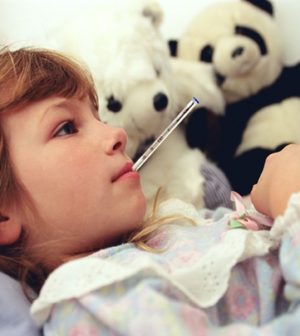- Could Your Grocery Store Meat Be Causing Recurring UTIs?
- Are You Making This Expensive Thermostat Error This Winter?
- Recognizing the Signs of Hypothyroidism
- 10 Strategies to Overcome Insomnia
- Could Artificial Sweeteners Be Aging the Brain Faster?
- Techniques for Soothing Your Nervous System
- Does the Water in Your House Smell Funny? Here’s Why
- Can a Daily Dose of Apple Cider Vinegar Actually Aid Weight Loss?
- 6 Health Beverages That Can Actually Spike Your Blood Sugar
- Treatment Options for Social Anxiety Disorder
When a Cold or Flu Strikes a Family Member

When one child gets sick, you might brace yourself for everyone getting sick. But it’s possible to keep healthy family members from falling ill, too.
When taking care of a sick child, handwashing is more important than ever. All healthy family members should wash frequently with soap and water or use an alcohol-based hand rub. Do this after every contact with the sick person, their room and bathroom, and any items he or she used.
Handwashing is a must after:
- Every contact with the sick child.
- Changing diapers.
- Cleaning soiled linens or clothing.
- Wiping the child’s nose.
Forget sharing right now — this extends from food, drinking glasses and utensils to combs, brushes and clothing, including hats and scarves.
According to the U.S. Centers for Disease Control and Prevention, your best bet is to create a sick room within your home for the patient, away from all common areas like the kitchen and family room. If you have more than one bathroom, designate one just for him or her. Clean the sick room and bathroom daily with a disinfectant.
And follow these smart clean-up rules:
- Have your child throw used tissues and other disposable items right into the trash.
- Clean all sickroom surfaces — including bedside tables, doorknobs and toys — with disinfectant.
- Collect all soiled sheets and towels in a laundry basket — don’t carry them in your arms. Wash and dry on the “hot” setting.
- Clean all eating dishes and utensils used by the sick person thoroughly before reusing.
Avoid face-to-face contact with the sick child and, if possible, have only one parent take care of him or her to protect the other adult. In the case of flu, ask your doctor if healthy family members should take antiviral medication for added protection.
And follow this key tip to avoid re-infection: Replace the sick person’s toothbrush after he or she recovers.
More information
The CDC has more advice on caring for a loved one with the flu, as well as what to do if you catch it.
Source: HealthDay
Copyright © 2026 HealthDay. All rights reserved.










